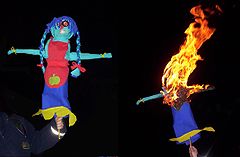marzanna — {{/stl 13}}{{stl 8}}rz. ż Ia, CMc. marzannannie {{/stl 8}}{{stl 20}} {{/stl 20}}{{stl 12}}1. {{/stl 12}}{{stl 7}} kukła ze słomy, która symbolizuje zimę i zgodnie ze znanym obrzędem jest topiona pierwszego dnia wiosny {{/stl 7}}{{stl 20}} {{/stl… … Langenscheidt Polski wyjaśnień
Marzanna — An artist s impression of Morana with Vesna. Maržanna, Mara, Maržena, Morana, Moréna, Mora, Marmora or Morena is a Slavic goddess associated with death, winter and nightmares. Some sources equate her with the Latvian goddess Māra, who takes a… … Wikipedia
marzanna — ż IV, CMs. marzannannie; lm D. marzannaann 1. gw. «kukła słomiana symbolizująca zimę, obnoszona po wsi, topiona podczas tego obrzędu na znak końca zimy» Topienie marzanny. 2. bot. «Rubia, roślina z rodziny marzanowatych, o drobnych kwiatach… … Słownik języka polskiego
Marzana, Marzanna (Mythologie) — Marzana, Marzanna (Mythologie), Marzanna, eine der wendischen und slavischen Hauptgöttinnen, welche einerlei mit der Siva oder der Liza, Zizilia, sein soll. Als planetarische Naturgottheit, Liebes , Erd und Mondgöttin, ist sie der griechischen… … Damen Conversations Lexikon
Morana — Marzanna, Murava, Moréna ou Morena, déesse slave de la Mort, associée à l hiver et aux cauchemars. Le Bucher de Morena est un festival folklorique toujours présent en Slovaquie, en Pologne et en République tchèque. Sources Marjorie Yovino Young.… … Wikipédia en Français
Mara (folklore) — mergefrom|Mora (mythology)|Talk:Mara (folklore)#Merger proposal|date=April 2008A mara, or a mare is a kind of malignant female wraith in Scandinavian folklore believed to cause nightmares. She also appears in Slavic folklore, but rather as a… … Wikipedia
List of Włatcy móch episodes — Description of particular episodes of Włatcy móch cartoon: Season 1 Lesson 1: Maślana s credit card (on DVD: Maślana s debt) Lesson 2: My name is Anusiak Lesson 3: Order for Maślana Lesson 4: Uncle Alfred Lesson 5: First communion Lesson 6:… … Wikipedia
Mara — may refer to: Contents 1 Social groups 2 People 3 Places 4 … Wikipedia
Slavic mythology — is the mythological aspect of the polytheistic religion that was practised by the Slavs before Christianisation. The religion possesses many common traits with other religions descended from the Proto Indo European religion. Zbruch Idol. Contents … Wikipedia
Polish mythology — comprises certain beliefs and myths in Poland, including witchcraft and some paganistic elements.The Polish pantheon Major gods*Dadźbóg *Yarilo * Piorun *The Zorya *Marzanna *Swietowit *Swaróg *Triglav *Weles * ZariaOther gods*Białobóg *Czarnobóg … Wikipedia

